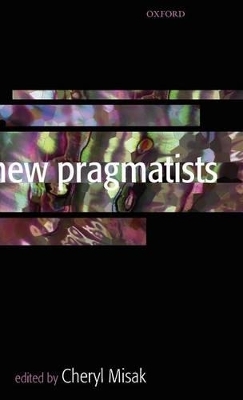
New Pragmatists
Seiten
2007
Oxford University Press (Verlag)
978-0-19-927997-5 (ISBN)
Oxford University Press (Verlag)
978-0-19-927997-5 (ISBN)
Pragmatism is the view that our philosophical concepts must be connected to our practices - philosophy must stay connected to first-order inquiry, to real examples, to real-life expertise. This book explores this and develop the pragmatist project, showing that pragmatism is a strong in philosophy.
Pragmatism is the view that our philosophical concepts must be connected to our practices - philosophy must stay connected to first order inquiry, to real examples, to real-life expertise. The classical pragmatists, Charles Sanders Peirce, William James, and John Dewey, put forward views of truth, rationality, and morality that they took to be connected to, and good for, our practices of inquiry and deliberation.
When Richard Rorty, the best-known contemporary pragmatist, looks at our practices, he finds that we don't aim at truth or objectivity, but only at solidarity, or agreement within a community, or what our peers will let us get away with saying. There is, however, a revisionist movement amongst contemporary philosophers who are interested in pragmatism. When these new pragmatists examine our practices, they find that the trail of the human serpent is over everything, as James said, but this does not toss us into the sea of post-modern arbitrariness, where truth varies from person to person and culture to culture. The fact that our standards of objectivity come into being and evolve over time does not detract from their objectivity. As Peirce and Dewey stressed, we are always immersed in a context of inquiry, where the decision to be made is a decision about what to believe from here, not what to believe were we able to start from scratch - from certain infallible foundations. But we do not go forward arbitrarily.
That is, these new pragmatists provide accounts of inquiry that are both recognizably pragmatic in orientation and hospitable to the cognitive aspiration to get one's subject matter right. The best of Peirce, James, and Dewey has thus resurfaced in deep, interesting, and fruitful ways, explored in this volume by David Bakhurst, Arthur Fine, Ian Hacking, David Macarthur, Danielle Macbeth, Cheryl Misak, Terry Pinkard, Huw Price, and Jeffrey Stout.
Pragmatism is the view that our philosophical concepts must be connected to our practices - philosophy must stay connected to first order inquiry, to real examples, to real-life expertise. The classical pragmatists, Charles Sanders Peirce, William James, and John Dewey, put forward views of truth, rationality, and morality that they took to be connected to, and good for, our practices of inquiry and deliberation.
When Richard Rorty, the best-known contemporary pragmatist, looks at our practices, he finds that we don't aim at truth or objectivity, but only at solidarity, or agreement within a community, or what our peers will let us get away with saying. There is, however, a revisionist movement amongst contemporary philosophers who are interested in pragmatism. When these new pragmatists examine our practices, they find that the trail of the human serpent is over everything, as James said, but this does not toss us into the sea of post-modern arbitrariness, where truth varies from person to person and culture to culture. The fact that our standards of objectivity come into being and evolve over time does not detract from their objectivity. As Peirce and Dewey stressed, we are always immersed in a context of inquiry, where the decision to be made is a decision about what to believe from here, not what to believe were we able to start from scratch - from certain infallible foundations. But we do not go forward arbitrarily.
That is, these new pragmatists provide accounts of inquiry that are both recognizably pragmatic in orientation and hospitable to the cognitive aspiration to get one's subject matter right. The best of Peirce, James, and Dewey has thus resurfaced in deep, interesting, and fruitful ways, explored in this volume by David Bakhurst, Arthur Fine, Ian Hacking, David Macarthur, Danielle Macbeth, Cheryl Misak, Terry Pinkard, Huw Price, and Jeffrey Stout.
Introduction ; 1. On Our Interest in Getting Things Right: Pragmatism without Narcissism ; 2. On Not Being a Pragmatist: Eight Reasons and a Cause ; 3. Relativism, Pragmatism, and the Practice of Science ; 4. Pragmatism and Deflationism ; 5. Pragmatism, Quasi-Realism, and the Global Challenge ; 6. Pragmatism and Ethical Particularism ; 7. Was Pragmatism the Successor to Idealism? ; 8. Pragmatism and Objective Truth
| Erscheint lt. Verlag | 8.3.2007 |
|---|---|
| Verlagsort | Oxford |
| Sprache | englisch |
| Maße | 145 x 224 mm |
| Gewicht | 370 g |
| Themenwelt | Geisteswissenschaften ► Philosophie ► Erkenntnistheorie / Wissenschaftstheorie |
| Geisteswissenschaften ► Philosophie ► Philosophie der Neuzeit | |
| ISBN-10 | 0-19-927997-7 / 0199279977 |
| ISBN-13 | 978-0-19-927997-5 / 9780199279975 |
| Zustand | Neuware |
| Haben Sie eine Frage zum Produkt? |
Mehr entdecken
aus dem Bereich
aus dem Bereich
die Grundlegung der modernen Philosophie
Buch | Softcover (2023)
C.H.Beck (Verlag)
18,00 €
Vorlesung Wintersemester 1951/52. [Was bedeutet das alles?]
Buch | Softcover (2023)
Reclam, Philipp (Verlag)
7,00 €


